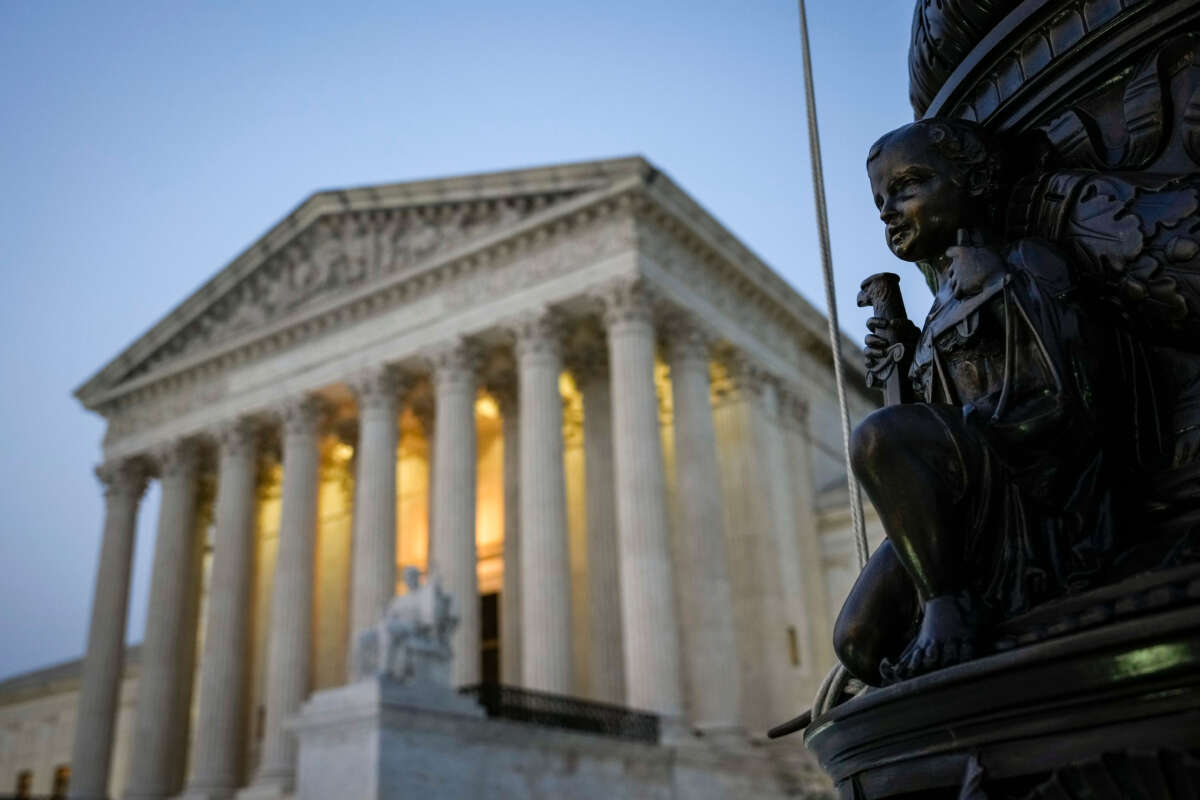Did you know that Truthout is a nonprofit and independently funded by readers like you? If you value what we do, please support our work with a donation.
The U.S. Supreme Court struck down race-based affirmative action in college admissions on Thursday, overturning nearly half a century of legal precedent in a decision that will almost certainly have devastating impacts on racial equity in higher education and society at large.
The majority of justices ruled in two closely related cases regarding Harvard University and the University of North Carolina that considering race in their admissions process was a violation of the 14th Amendment’s equal protection clause, an amendment originally established to give rights to formerly enslaved people.
The Court ruled six to three on the UNC case and six to two in the Harvard case, with Justice Ketanji Brown Jackson recusing in the latter. Justices John Roberts, Clarence Thomas, Samuel Alito, Neil Gorsuch, Brett Kavanaugh, and Amy Coney Barrett ruled in the majority, with Roberts writing the opinion. The Court’s three liberal justices dissented.
The impacts of this decision will reverberate for decades to come and will majorly disadvantage non-white people — especially those who are Black, Latinx or Indigenous — in the college admissions process. Data from states that have banned affirmative action shows that admissions of underrepresented groups plummets when colleges no longer consider race in admissions.
The decision overturns 45 years of precedent after the Supreme Court first approved the use of affirmative action in college admissions in 1978, with the current far right Court continuing its streak of going against decades of established legal opinions to hand wins to right-wing activists.
In their decisions, the majority seemingly embraced the debunked myth of reverse racism, holding that the practice of affirmative action “employ[s] race in a negative manner” and without “meaningful end points,” as Roberts wrote. In considering race in the admissions process, Roberts wrote, colleges “have concluded, wrongly, that the touchstone of an individual’s identity is not challenges bested, skills built, or lessons learned but the color of their skin. Our constitutional history does not tolerate that choice.”
Other justices submitted concurrences that further displayed the racism present within the Court’s conservative majority. Gorsuch went as far as to say in his concurrence that the Civil Rights Act, the landmark civil rights law prohibiting race- and sex-based discrimination in many arenas of life, actually prohibits race-conscious admissions — a questionable argument at best.
Meanwhile, Thomas hailed the concept of a “colorblind Constitution” that “put[s] aside its citizens’ skin color,” using arguments that Jackson, in a response to his rebuttal of her opinion, wholly denounced as “ignit[ing] too many more straw men to list, or fully extinguish, here.”
Of course, governing while “colorblind” would require one to ignore the centuries of oppression that created the systems that now require government leaders to consider people’s skin color in order to work towards equity — not maintain the current systems that still financially, socially and violently oppress Black and other nonwhite people today, as Thomas seems to pine for. (Thomas also seems to hold the baffling position that he, as a Black man, is a victim of affirmative action with his admission into Yale Law School in the 1970s.)
Perhaps demonstrative of the modern systems of oppression is the fact that Roberts explicitly carved out military academies’ ability to practice race-conscious admissions — essentially saying that racially marginalized populations are still allowed to have preference in enrolling in the Army to put their lives on the line for the military industrial system, but not for academic applications that could advance their and their communities’ wellbeing. The previous arguments about reverse racism seem not to apply here.
In other words, the majority appeared to have agreed to maintain a system to continue racial oppression while ruling that that same racism can’t be considered in applications that tip the scales toward justice.
Jackson wrote a scathing dissent saying that the majority opinion ignores that racial equity has never existed in the U.S. — with Black Americans in particular still living under the effects of slavery past and present — and is handed down “without any basis in law, history, logic, or justice.”
She then traced the history of racism against Black people in the U.S., discussing slavery giving way to Jim Crow and racism encoded within the New Deal giving way to modern race-based oppression, with “race-blind” policies harming Black communities in areas of finance, the environment, and more.
“With let-them-eat-cake obliviousness, today, the majority pulls the ripcord and announces ‘colorblindness for all’ by legal fiat. But deeming race irrelevant in law does not make it so in life,” Jackson wrote. “The Court has come to rest on the bottom-line conclusion that racial diversity in higher education is only worth potentially preserving insofar as it might be needed to prepare Black Americans and other underrepresented minorities for success in the bunker, not the boardroom.”
“It would be deeply unfortunate if the Equal Protection Clause actually demanded this perverse, ahistorical, and counterproductive outcome,” she continued. “To impose this result in that Clause’s name when it requires no such thing, and to thereby obstruct our collective progress toward the full realization of the Clause’s promise, is truly a tragedy for us all.”
Media that fights fascism
Truthout is funded almost entirely by readers — that’s why we can speak truth to power and cut against the mainstream narrative. But independent journalists at Truthout face mounting political repression under Trump.
We rely on your support to survive McCarthyist censorship. Please make a tax-deductible one-time or monthly donation.
